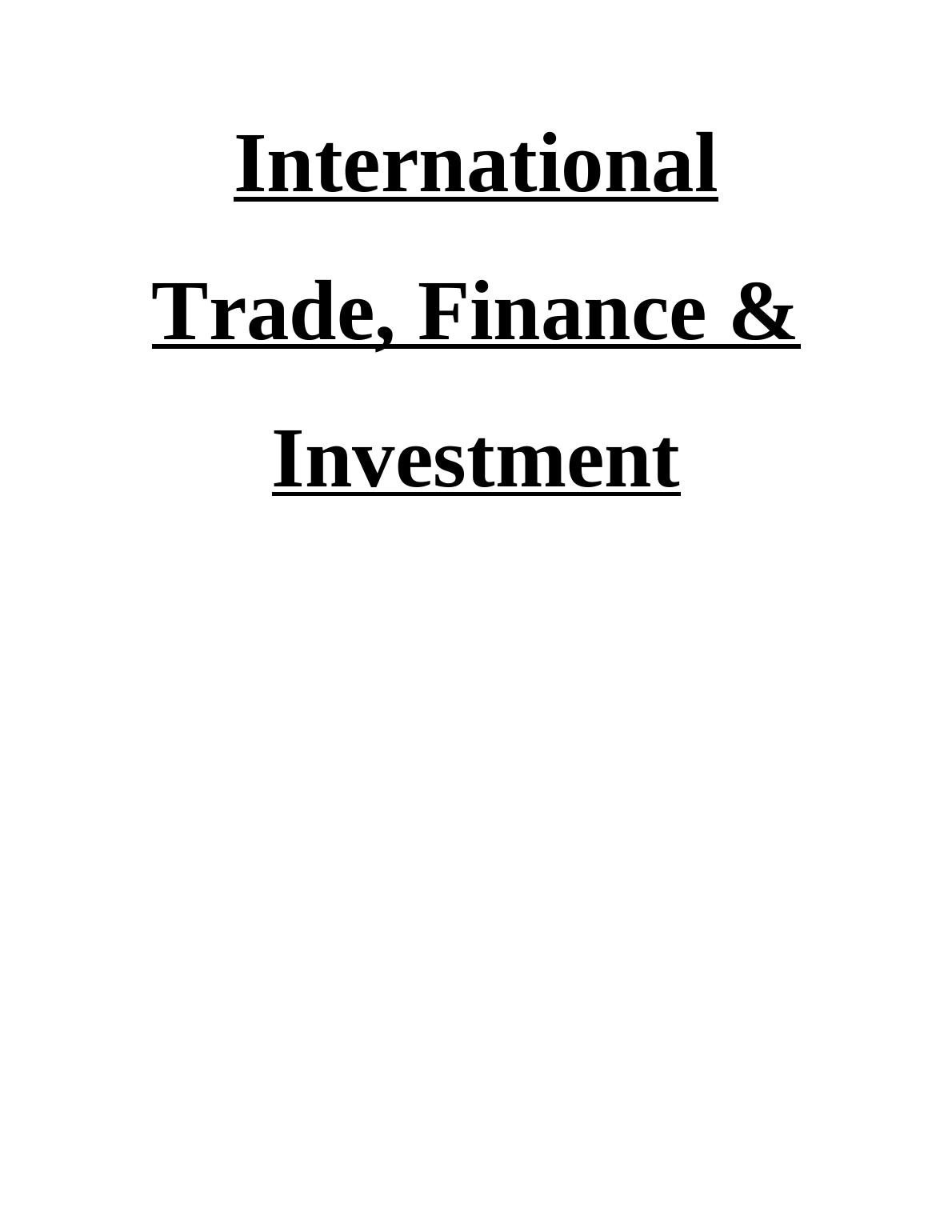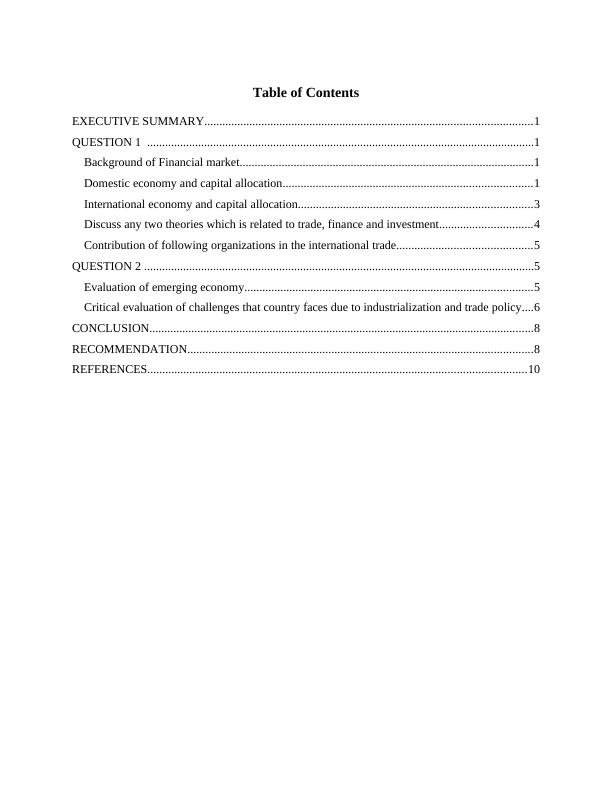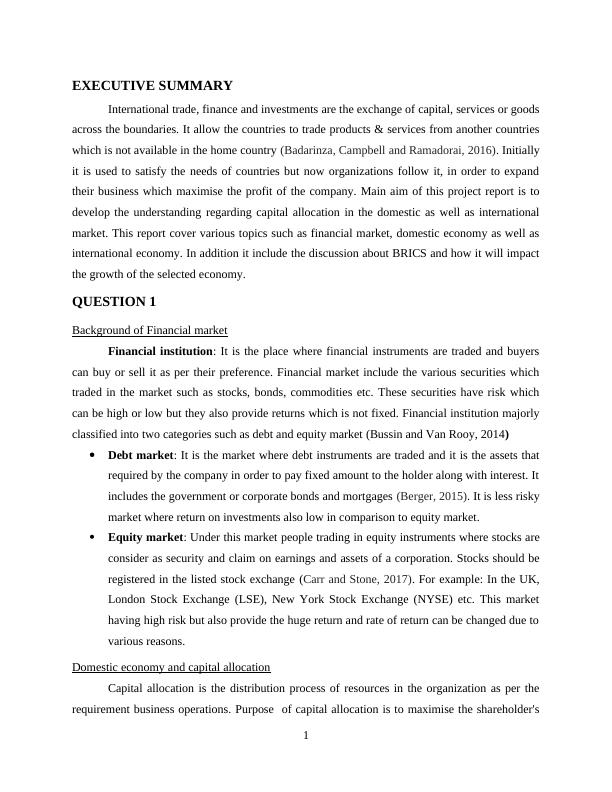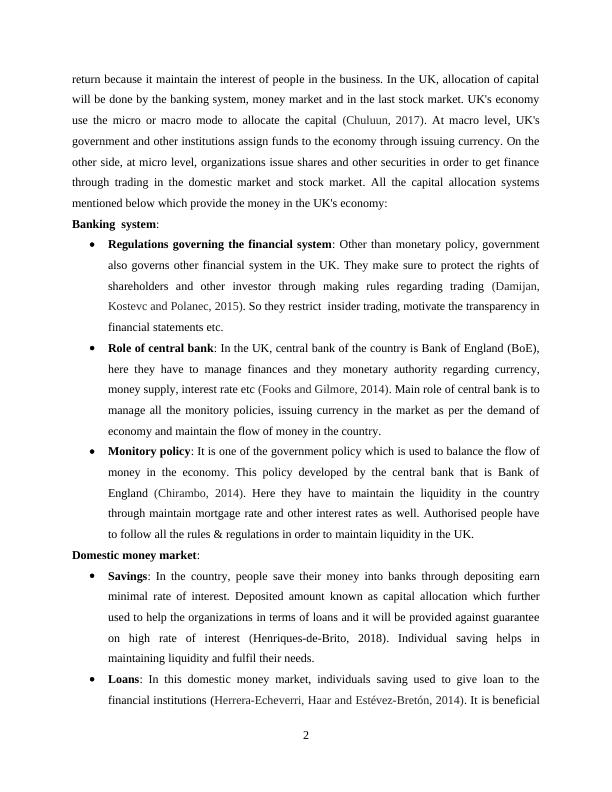International Trade, Finance & Investment
13 Pages4304 Words1 Views
Added on 2023-01-18
International Trade, Finance & Investment
Added on 2023-01-18
ShareRelated Documents
International
Trade, Finance &
Investment
Trade, Finance &
Investment

Table of Contents
EXECUTIVE SUMMARY.............................................................................................................1
QUESTION 1 .................................................................................................................................1
Background of Financial market..................................................................................................1
Domestic economy and capital allocation...................................................................................1
International economy and capital allocation..............................................................................3
Discuss any two theories which is related to trade, finance and investment...............................4
Contribution of following organizations in the international trade.............................................5
QUESTION 2 ..................................................................................................................................5
Evaluation of emerging economy................................................................................................5
Critical evaluation of challenges that country faces due to industrialization and trade policy....6
CONCLUSION................................................................................................................................8
RECOMMENDATION...................................................................................................................8
REFERENCES..............................................................................................................................10
EXECUTIVE SUMMARY.............................................................................................................1
QUESTION 1 .................................................................................................................................1
Background of Financial market..................................................................................................1
Domestic economy and capital allocation...................................................................................1
International economy and capital allocation..............................................................................3
Discuss any two theories which is related to trade, finance and investment...............................4
Contribution of following organizations in the international trade.............................................5
QUESTION 2 ..................................................................................................................................5
Evaluation of emerging economy................................................................................................5
Critical evaluation of challenges that country faces due to industrialization and trade policy....6
CONCLUSION................................................................................................................................8
RECOMMENDATION...................................................................................................................8
REFERENCES..............................................................................................................................10

EXECUTIVE SUMMARY
International trade, finance and investments are the exchange of capital, services or goods
across the boundaries. It allow the countries to trade products & services from another countries
which is not available in the home country (Badarinza, Campbell and Ramadorai, 2016). Initially
it is used to satisfy the needs of countries but now organizations follow it, in order to expand
their business which maximise the profit of the company. Main aim of this project report is to
develop the understanding regarding capital allocation in the domestic as well as international
market. This report cover various topics such as financial market, domestic economy as well as
international economy. In addition it include the discussion about BRICS and how it will impact
the growth of the selected economy.
QUESTION 1
Background of Financial market
Financial institution: It is the place where financial instruments are traded and buyers
can buy or sell it as per their preference. Financial market include the various securities which
traded in the market such as stocks, bonds, commodities etc. These securities have risk which
can be high or low but they also provide returns which is not fixed. Financial institution majorly
classified into two categories such as debt and equity market (Bussin and Van Rooy, 2014)
Debt market: It is the market where debt instruments are traded and it is the assets that
required by the company in order to pay fixed amount to the holder along with interest. It
includes the government or corporate bonds and mortgages (Berger, 2015). It is less risky
market where return on investments also low in comparison to equity market.
Equity market: Under this market people trading in equity instruments where stocks are
consider as security and claim on earnings and assets of a corporation. Stocks should be
registered in the listed stock exchange (Carr and Stone, 2017). For example: In the UK,
London Stock Exchange (LSE), New York Stock Exchange (NYSE) etc. This market
having high risk but also provide the huge return and rate of return can be changed due to
various reasons.
Domestic economy and capital allocation
Capital allocation is the distribution process of resources in the organization as per the
requirement business operations. Purpose of capital allocation is to maximise the shareholder's
1
International trade, finance and investments are the exchange of capital, services or goods
across the boundaries. It allow the countries to trade products & services from another countries
which is not available in the home country (Badarinza, Campbell and Ramadorai, 2016). Initially
it is used to satisfy the needs of countries but now organizations follow it, in order to expand
their business which maximise the profit of the company. Main aim of this project report is to
develop the understanding regarding capital allocation in the domestic as well as international
market. This report cover various topics such as financial market, domestic economy as well as
international economy. In addition it include the discussion about BRICS and how it will impact
the growth of the selected economy.
QUESTION 1
Background of Financial market
Financial institution: It is the place where financial instruments are traded and buyers
can buy or sell it as per their preference. Financial market include the various securities which
traded in the market such as stocks, bonds, commodities etc. These securities have risk which
can be high or low but they also provide returns which is not fixed. Financial institution majorly
classified into two categories such as debt and equity market (Bussin and Van Rooy, 2014)
Debt market: It is the market where debt instruments are traded and it is the assets that
required by the company in order to pay fixed amount to the holder along with interest. It
includes the government or corporate bonds and mortgages (Berger, 2015). It is less risky
market where return on investments also low in comparison to equity market.
Equity market: Under this market people trading in equity instruments where stocks are
consider as security and claim on earnings and assets of a corporation. Stocks should be
registered in the listed stock exchange (Carr and Stone, 2017). For example: In the UK,
London Stock Exchange (LSE), New York Stock Exchange (NYSE) etc. This market
having high risk but also provide the huge return and rate of return can be changed due to
various reasons.
Domestic economy and capital allocation
Capital allocation is the distribution process of resources in the organization as per the
requirement business operations. Purpose of capital allocation is to maximise the shareholder's
1

return because it maintain the interest of people in the business. In the UK, allocation of capital
will be done by the banking system, money market and in the last stock market. UK's economy
use the micro or macro mode to allocate the capital (Chuluun, 2017). At macro level, UK's
government and other institutions assign funds to the economy through issuing currency. On the
other side, at micro level, organizations issue shares and other securities in order to get finance
through trading in the domestic market and stock market. All the capital allocation systems
mentioned below which provide the money in the UK's economy:
Banking system:
Regulations governing the financial system: Other than monetary policy, government
also governs other financial system in the UK. They make sure to protect the rights of
shareholders and other investor through making rules regarding trading (Damijan,
Kostevc and Polanec, 2015). So they restrict insider trading, motivate the transparency in
financial statements etc.
Role of central bank: In the UK, central bank of the country is Bank of England (BoE),
here they have to manage finances and they monetary authority regarding currency,
money supply, interest rate etc (Fooks and Gilmore, 2014). Main role of central bank is to
manage all the monitory policies, issuing currency in the market as per the demand of
economy and maintain the flow of money in the country.
Monitory policy: It is one of the government policy which is used to balance the flow of
money in the economy. This policy developed by the central bank that is Bank of
England (Chirambo, 2014). Here they have to maintain the liquidity in the country
through maintain mortgage rate and other interest rates as well. Authorised people have
to follow all the rules & regulations in order to maintain liquidity in the UK.
Domestic money market:
Savings: In the country, people save their money into banks through depositing earn
minimal rate of interest. Deposited amount known as capital allocation which further
used to help the organizations in terms of loans and it will be provided against guarantee
on high rate of interest (Henriques-de-Brito, 2018). Individual saving helps in
maintaining liquidity and fulfil their needs.
Loans: In this domestic money market, individuals saving used to give loan to the
financial institutions (Herrera-Echeverri, Haar and Estévez-Bretón, 2014). It is beneficial
2
will be done by the banking system, money market and in the last stock market. UK's economy
use the micro or macro mode to allocate the capital (Chuluun, 2017). At macro level, UK's
government and other institutions assign funds to the economy through issuing currency. On the
other side, at micro level, organizations issue shares and other securities in order to get finance
through trading in the domestic market and stock market. All the capital allocation systems
mentioned below which provide the money in the UK's economy:
Banking system:
Regulations governing the financial system: Other than monetary policy, government
also governs other financial system in the UK. They make sure to protect the rights of
shareholders and other investor through making rules regarding trading (Damijan,
Kostevc and Polanec, 2015). So they restrict insider trading, motivate the transparency in
financial statements etc.
Role of central bank: In the UK, central bank of the country is Bank of England (BoE),
here they have to manage finances and they monetary authority regarding currency,
money supply, interest rate etc (Fooks and Gilmore, 2014). Main role of central bank is to
manage all the monitory policies, issuing currency in the market as per the demand of
economy and maintain the flow of money in the country.
Monitory policy: It is one of the government policy which is used to balance the flow of
money in the economy. This policy developed by the central bank that is Bank of
England (Chirambo, 2014). Here they have to maintain the liquidity in the country
through maintain mortgage rate and other interest rates as well. Authorised people have
to follow all the rules & regulations in order to maintain liquidity in the UK.
Domestic money market:
Savings: In the country, people save their money into banks through depositing earn
minimal rate of interest. Deposited amount known as capital allocation which further
used to help the organizations in terms of loans and it will be provided against guarantee
on high rate of interest (Henriques-de-Brito, 2018). Individual saving helps in
maintaining liquidity and fulfil their needs.
Loans: In this domestic money market, individuals saving used to give loan to the
financial institutions (Herrera-Echeverri, Haar and Estévez-Bretón, 2014). It is beneficial
2

End of preview
Want to access all the pages? Upload your documents or become a member.
Related Documents
International Trade, Finance & Investmentlg...
|13
|3925
|1
International Investment Trade, Finance & Executive Summarylg...
|13
|3675
|25
Comprehensive Report on Financelg...
|11
|3295
|82
International Trade Finance and Investment: Capital Allocation, Theories, and Challenges Faced by Emerging Economieslg...
|13
|3870
|174
International Trade Finance and Investment: Capital Allocation, Emerging Economy Challenges, and Trade Theorieslg...
|13
|3749
|98
International Trade, Finance, and Investmentlg...
|20
|4369
|1
